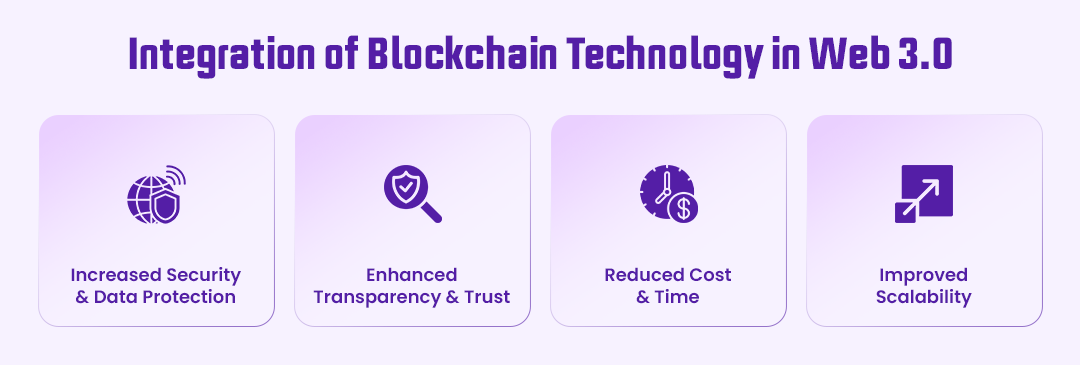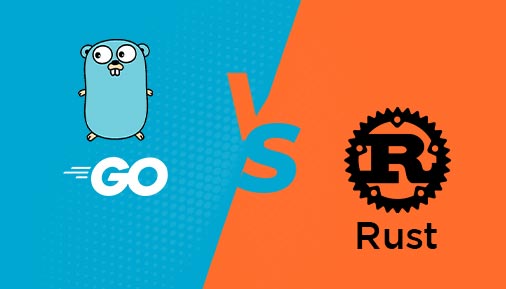With the rising digital transformation, the way businesses and organisations communicate, store data and interact with each other will transform drastically. This advancement in technology demands more advanced and innovative frameworks that are secure, distributed, transparent and efficient.
This is where blockchain development solutions come into play. Specifically, as the world is shifting towards Web 3.0 from Web 2.0, the role of blockchain technology will be extremely crucial in enabling secure, trustless and distributed interactions between various entities.
In this article, we will explore everything about the role of blockchain technology in the evolution of Web 3.0. But first, let’s dive into some basics to have better clarity about both the tech advancements from the perspective of your business.
What exactly is Web 3.0?
Web 3.0, also known as the Semantic Web, is a new way of using technology to interact with data and information in a more meaningful way. It is an evolution of Web 2.0, the current web technology that allows users to interact with websites and applications in a more user-friendly way. But the concept of Web 3.0 goes beyond the interactive nature of websites and applications, as it is focused on providing machines with a greater understanding of the data they are interacting with.
Leveraging Web 3.0 technologies, businesses can access and interpret data in an easier and quicker way. Web 3.0 also enables these businesses to scale in a decentralized way, enabling them to be more agile and efficient. Some crucial advancements of Web 3.0 are blockchain, distributed ledgers, artificial intelligence (AI), machine learning (ML) and the Internet of Things (IoT).
Why is the shift from Web 2.0 to Web 3.0 happening and is it important?
 Web 2.0, which is the current version of the internet, essentially uses a centralized infrastructure that focuses on user experience and efficiency. It allows users to interact and exchange information on simple web applications.
Web 2.0, which is the current version of the internet, essentially uses a centralized infrastructure that focuses on user experience and efficiency. It allows users to interact and exchange information on simple web applications.
The major limitation of Web 2.0 is that it cannot provide the security, privacy, and trust needed for secure interactions. This is why there is a need to shift to Web 3.0 which uses blockchain technology as its backbone.
In Web 3.0, users will be able to store data, manage digital assets and create smart contracts securely without relying on third parties. Blockchain technology enables distributed networks, which allow users to interact and transact without having a centralised authority.
Therefore, Web 3.0 promises to usher in a new era of trustless and transparent digital interactions. Moreover, Web 3.0 will enable and empower enterprises to have better control over their data and digital assets.
Web 3.0 will play a crucial role in the successful adoption of blockchain for a wide range of applications. For example, using blockchain development services, companies can create immutable records for digital documents, facilitate secure financial transactions, and provide end-to-end encryption for sensitive data.
What is Blockchain Technology?
Blockchain technology is a decentralized, immutable and distributed ledger of records. It allows users to securely store and exchange data without any third-party intermediaries such as banks or governments.
It enables the use of cryptographically secure digital tokens to represent both physical and virtual assets. These tokens are stored on the blockchain network, which is secured by cryptography and consensus algorithms.
Blockchain technology is the perfect fit for Web 3.0 because of its secure and distributed nature. The development of blockchain-based applications has allowed for efficient data sharing, storage and transactions between users on a secure network. Furthermore, these networks can also be used to store and share data without the need for intermediaries.
Why is blockchain the cornerstone of Web 3.0?
Blockchain is the key technology that enables secure, distributed and trustless interactions. Leveraging the power of distributed ledger, enterprises can tap into the potential of blockchain to create applications that can facilitate complex Web 3.0 operations without relying on third-party intermediaries.
Moreover, the distributed nature of blockchain helps reduce overhead costs and increase transparency. This implies that by using Web 3.0, users can easily track the source of information, control the data that is shared, and ensure quick dispute resolution by leveraging blockchain smart contracts.
Blockchain also helps in establishing trust and reducing the risk of data breaches in Web 3.0 networks. The technology is designed to be immutable and incorruptible, which makes it hard for attackers to alter or delete data.
Finally, blockchain technology helps in reducing costs associated with identity management and compliance. For example, identity management takes a lot of time and effort for companies, but with the help of blockchain, this process becomes automated without compromising security using smart contracts.
Integration of Blockchain Technology in Web 3.0:
 The integration of blockchain technology into Web 3.0 has been instrumental in allowing businesses to transfer, store and access data securely and efficiently. Specifically, the following benefits can be unlocked by integrating blockchain technology into your business:
The integration of blockchain technology into Web 3.0 has been instrumental in allowing businesses to transfer, store and access data securely and efficiently. Specifically, the following benefits can be unlocked by integrating blockchain technology into your business:
Increased Security & Data Protection: Blockchain technology enables organizations to secure their data while providing them with greater scalability and security. By leveraging consensus algorithms, double-spend protection and encryption techniques, the data stored on the blockchain is extremely secure.
Enhanced Transparency & Trust: Blockchain technology allows businesses to increase their transparency and trust in data sharing and transactions. All participants of a blockchain network are able to access all the records stored on it, eliminating any chances of fraud or malicious activities.
Reduced Cost & Time: Blockchain technology reduces time and cost related to data storage, sharing and transactions. As there are no third parties involved in any transactions, it eliminates the transaction fees and also ensures faster processing times when compared to traditional methods.
Improved Scalability: Blockchain networks can be easily scaled up or down to accommodate more users and data. This allows businesses to easily manage the increasing amount of data that needs to be stored and accessed.
The transforming role of blockchain in Web 3.0
Before you hire the best Web3 development company for your company’s digital transformation, let’s understand the role of blockchain in Web 3.0 and how it’s shaping a better tomorrow for the internet world:
Establishing a decentralised trust-based transaction system:
Using blockchain frameworks like Ethereum, companies can create decentralised trust-based transactions. This makes it easier for users to exchange digital assets without relying on an intermediary. This is beneficial for applications such as supply chain management, where trust and transparency are essential.
Companies dealing with digital goods, such as music and film streaming services, can also use blockchain-based digital asset management systems to securely manage their digital assets. Compared to a conventional centralised transaction system, these transactions are more secure and have reduced transaction costs.
Secure and immutable data storage:
The use of blockchain to store digital records ensures that the data is secure and immutable. This makes it difficult for malicious actors to tamper with the stored data, which is extremely important for applications that require secure data storage.
Moreover, blockchain is used to create secure digital identities, which makes it difficult for unauthorised entities to gain access to sensitive data. This is particularly important for applications that require authentication like banking and finance. Moreover, with the concept of tokenization, companies can create digital assets that are secured by advanced cryptography.
Smart contracts enabled peer-to-peer transactions:
With robust Web3 development services, enterprises can establish bespoke smart contracts, which allow users to transact without relying on a central authority. Smart contracts enable the automated execution of processes, allowing companies to gain better control over their digital assets.
As cyber security threats are surging with the increasing use of the internet, Web 3.0 is expected to make a significant contribution towards making digital interactions more secure and transparent. With blockchain technology as its backbone, Web 3.0 is expected to revolutionise the way we interact and transact in the digital world.
Advanced AML implementation across financial institutes:
With the use of blockchain, financial institutions can automate anti-money laundering (AML) processes while adopting Web 3.0 applications. This is done by leveraging smart contracts to verify user activities and flag any suspicious transactions. This helps in reducing the risk of financial losses due to fraudulent activities.
Moreover, companies can opt for the top Web3 development solutions to migrate their legacy payment systems to blockchain-based platforms. This allows enterprises to secure their transactions while providing an enhanced customer experience.
Fundraising becomes easier and more auditable:
Organisations can also use blockchain-based Web 3.0 applications to make fundraising easier and more auditable compared to conventional methods. Startup founders and even conventional business owners can leverage blockchain-based fundraising platforms to raise funds from potential investors.
By working with the best-hire blockchain developers, it becomes easier to both create an ICO mechanism or create a seamless funding process. Ultimately, this type of funding allows startups to quickly grow their business with minimal effort and cost.
How Blockchain Enhances Data Security For Web 3.0 Users?
The integration of blockchain technology into Web 3.0 has improved the security of user data by providing a secure, distributed and immutable ledger of records. By leveraging consensus algorithms, double-spend protection and encryption techniques, the data stored on the blockchain is extremely secure.
Furthermore, all participants in the network have access to all the records stored on it, which makes it difficult for malicious activities to occur. This ensures that all users have a complete view of the data stored on the blockchain and can easily detect any irregularities or discrepancies in the data.
In addition, smart contracts provide an added layer of security by ensuring that all conditions set by users are met while executing transactions on the blockchain. This ensures that the data is always secure and tamper-proof.
Overall, blockchain technology provides an enhanced level of security and verifiability to Web 3.0 users that were not previously available with traditional methods. By leveraging distributed ledgers, cryptography and consensus algorithms, blockchain can provide a secure platform for data storage and exchange, allowing users to trust each other and transact with confidence.
Web 3.0 blockchain use cases in 2023 and beyond:
In 2023 and beyond, blockchain-based Web 3.0 applications are expected to play a vital role in various industries, such as e-commerce, logistics, healthcare, supply chain, energy, and finance.
These applications can help improve the efficiency of data sharing, transaction processing, identity management, and smart contract implementation at a much lower cost. Moreover, with the introduction of distributed ledger technology, Web 3.0 applications can help reduce data redundancy and enable faster and more secure transactions.
Furthermore, the use of blockchain in Web 3.0 applications can lead to more secure and transparent financial transactions, helping companies reduce their risk of fraud and cyber-attacks.
Especially in industries like logistics and finance where real-time data is essential, Web 3.0 applications can help reduce the time and cost associated with data processing by allowing decentralised validation of transactions.
Advantages and Disadvantages of Web 3.0
Advantages:
- Increased security and data protection through encryption, distributed ledgers, and consensus algorithms.
- Reduced cost and time associated with data storage, sharing, and transactions.
- Improved scalability to accommodate more users and data.
- Enhanced transparency and trust through a shared ledger of records.
- Smart contracts provide an added layer of security when executing transactions on the blockchain.
Disadvantages:
- The lack of standardization in blockchain technology makes it difficult for businesses to adopt it.
- High energy costs are associated with mining and verifying transactions on the blockchain.
- Limited scalability in some cases due to the growing size of blockchain networks.
- Data stored on the blockchain is immutable, making it difficult to correct errors or update information.
Why hire Auxano Global Services for Blockchain and Web3 development?
Auxano Global Services is the top mobile app development company, offering end-to-end solutions for blockchain and Web 3.0 development services. Our team of experienced developers is equipped with the necessary skills to help you create a robust and secure blockchain-based application for your business.
We specialise in developing custom Web 3.0 applications that are tailored to the unique needs of our clients. By leveraging the latest blockchain technology, we ensure that our applications are secure and reliable.
AGS team also offers comprehensive consulting services to help you make the most of your blockchain and Web 3.0 investments. Our team can guide you on the right tools, blockchain frameworks, and development processes to ensure the success of your project.
Get in touch with the AGS team today to find out more about our blockchain and Web 3.0 development services.
Wrapping up!
Web 3.0 blockchain applications are revolutionising the way businesses operate and interact with customers, vendors, and partners. By leveraging the power of blockchain, organisations can build secure and transparent applications that are future-ready and cost-effective.
With the help of the hire web developers from Auxano Global Services, organisations can easily create an application that is tailored to their specific needs. AGS team is a full-fledged Web 3.0 company also offering NFT development services, interactive gaming applications, and high-quality blockchain consulting services. Contact AGS today to get started with your project!
Frequently Asked Questions
-
1. What is Web 3.0 blockchain?
Web 3.0 blockchain refers to the use of distributed ledger technology in creating Web 3.0 applications for businesses. These applications are powered by blockchain and make use of distributed ledger technology to provide more secure, transparent, and faster transactions.
-
2. What are the use cases of Web 3.0 blockchain?
Web 3.0 blockchain applications are used in various industries, such as e-commerce, logistics, healthcare, supply chain, energy, and finance.
-
3. How can a company benefit from Web 3.0 blockchain?
Companies can benefit from Web 3.0 blockchain in many ways, such as improved efficiency of data sharing, faster transaction processing, improved identity management, and reduced cost of smart contract integration.
-
4. Is blockchain development expensive?
No, blockchain development is not expensive. By using the right tools and technologies, organizations can build secure and efficient blockchain applications that are cost-effective.
-
5. How can AGS help my company with blockchain development?
At Auxano Global Services, we specialize in developing blockchain applications for businesses to solve their challenges related to data processing, security enhancement, and much more.





![How to Hire a Web Development Company? [Ultimate Guide 2022]](https://auxanoglobalservices.co.uk/new/wp-content/uploads/2021/11/How-to-Hire-a-Web-Development-Company-Ultimate-Guide-2021-2022-506x289.png)